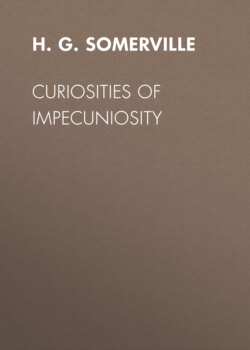Читать книгу Curiosities of Impecuniosity - H. G. Somerville - Страница 6
На сайте Литреса книга снята с продажи.
Оглавление“December 24th, 1812.
“Sir,
“I am far from displeased with the proof you have given me of your confidence, and which displays great zeal, power of memory, and attention. I am obliged to go out of town, and shall not be settled in town till the end of January. I will then see you at any time you wish. It would gratify me to be of any service to you. I wish it may be in my power.
“I am, sir,
“Your obedient, humble servant,
“H. Davy.”
Through Sir Humphry’s interest, Faraday obtained the post of assistant in the laboratory of the Royal Institution, where he remained ever afterwards, eventually becoming its first professor. Tyndall says of Faraday, “His work excites admiration, but contact with him warms and elevates the heart. Here, surely, is a strong man. I love strength, but let me not forget its union with modesty, tenderness, and sweetness in the character of Faraday.... Taking the duration of his life into account, this son of a blacksmith and apprentice to a bookbinder had to decide between a fortune of £150,000 on the one side, and his unendowed science on the other. He chose the latter, and died a poor man. But his was the glory of holding aloft among the nations the scientific name of England for a period of forty years.” In 1835, when Sir Robert Peel retired from office, he recommended Faraday to William IV. for a pension of £300. The minute was placed in the hands of Lord Melbourne, Peel’s successor, who saw Faraday, and involved him in religious and political discussion, wanting to entrap the philosopher into a promise to support the Government. Failing in this, Lord Melbourne said, “I look upon the whole system of giving pensions to literary and scientific people as a piece of gross humbug.” To which Faraday replied, “After this, my lord, I see that my business with you is ended. I wish you good morning.” The next day Lord Melbourne received the following letter:
“My Lord,
“After the pithy manner in which your Lordship was pleased to express your sentiments on the subject of pensions that have been granted to literary and scientific persons, it only remains for me to relieve you, as far as I am concerned, from all further uneasiness. I will not accept any favour at your hands nor at the hands of any Cabinet of which you are a member.
“M. Faraday.”
It is said that for some years Faraday’s income never exceeded £22 a year, and it is a fact that when a youth he was much exercised about the purchase of an electrical machine which he had seen in an optician’s window, price 4s. 6d. He had no money, but out of his dinner allowance he saved the requisite sum, and this machine was the one he used in all those early experiments which led to some of his great discoveries.
